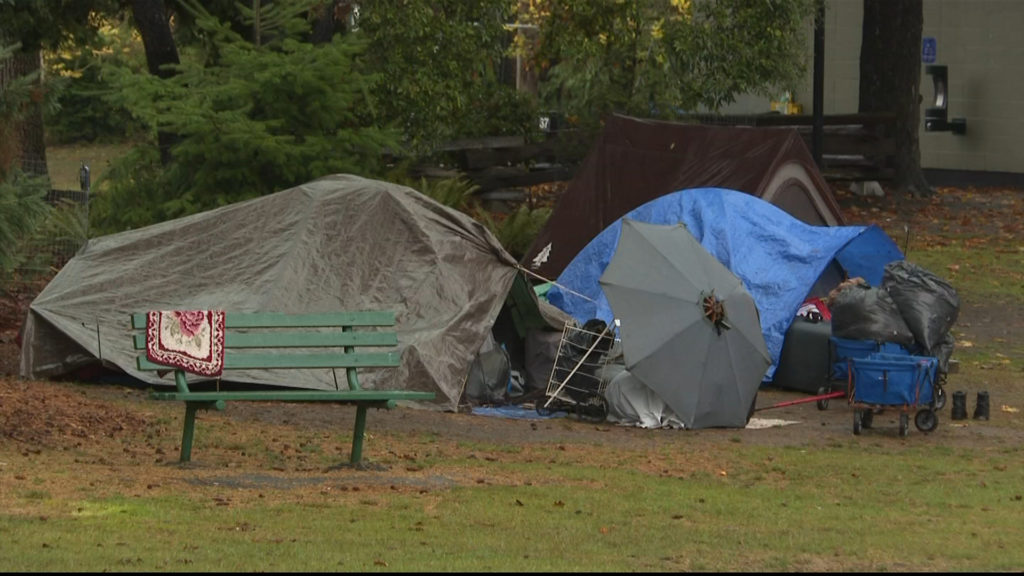
Thursday’s Victoria Council meeting highlighted the jurisdictional quandaries the municipality faces in its bid to address a rising province-wide housing crisis and increasing numbers of people living in its parks and streets.
A debate on motion amendments regarding sheltering in parks put a spotlight on larger jurisdictional issues that affect the city’s capacity to address what is a complex and growing issue.
The 2023 Point in Time (PiT) Count, released in March, found that at least 1,600 individuals were experiencing homelessness in Greater Victoria. An alarmingly disproportionate number of them are Indigenous people.
Councillor comments on amendments to a motion on the creation of seasonal shelters and to sheltering prohibitions, specifically in Irving and Vic West Parks, spoke to larger jurisdictional boundaries and burdens. The overarching theme was the enormity and complexity of the challenge, as well as how and to what extent the municipality can expand its efforts to meet it.
Council wants more help from BC and feds
In the past, the city has worked to address the homelessness crisis by investing in supportive housing and temporary shelter options, but the scale of the problem remains daunting. Enduring economic impacts of the pandemic, lack of affordable housing, stagnant wages and an opioid crisis have all conspired to push more individuals onto the streets in the region.
According to the Canadian Observatory on Homelessness (COoH, figuring out how to shelter a growing number of unhoused people requires coordinated efforts between non-profit organizations and all levels of government based on individual case management. Case management, defined by the COoH “is a collaborative approach that ensures people experiencing homelessness receive the services and supports they need in order to move forward with their lives.”
SEE ALSO: More supports needed to address homelessness, B.C. government says after survey
The council was unanimous in its opinion that providing these services and supports is a burden bigger than its municipal shoulders can carry. In her public appeal to the federal government last month, Mayor Alto writes “What our city urgently needs now is more generous and immediate federal housing funding.” In April, the provincial government released its Belonging in BC strategy with an unprecedented budget commitment of $1.8M. But the work to make the provincial housing plan a reality here is beyond what the city staff can support.
Coun. Jeremy Caradonna recognised past successes of initiatives like the city’s park relocation program, where outreach staff and by-law officers assist those who have been offered transitional housing to move but he also acknowledged their limitations. “I think, in the long run, this work should be taken over by the province. We are stepping a bit outside of our lane here in an interim way.”
City staff too overburdened to do more, mayor says
Mayor Alto agreed. She was the lone dissenter on an amendment that would see the city increase its efforts in working with the province to reach broader regional housing solutions. She argued it would be an undue burden on an already overburdened municipal staff.
If Victoria is to ever achieve “functional zero,” a term the Alliance to End Homelessness in the Capital Region and other housing and anti-poverty advocates use to describe ideal thresholds of people exiting homelessness each month.
According to a loose formula based on population, having no more than three people over a three-month period experiencing homelessness in Victoria is considered its functional zero. In less mathematical terms, the term simply means there are enough services and resources to meet the needs of individuals either experiencing homelessness or transitioning out of it.
Achieving it at the municipal level presents a multifaceted challenge because it requires a coordinated and holistic effort among social services, healthcare providers, law enforcement, and housing agencies. It’s clear that not all of these fall under the city’s jurisdiction and it is precisely in the cracks between these jurisdictional lines where the roots of the housing crisis in Victoria grow.
Councillors draw line: “We are not taking over this work”
Overcoming these bureaucratic silos and fostering collaboration between diverse government stakeholders may be a crucial goal for Victoria in overcoming the crisis. But city resources only stretch so far and there are limits to staff resources, a reality emphasized yesterday in the Mayor’s dissent.
Coun. David Thompson said that “they’re the province is going to have to deal with poverty and a wide range of core upstream causes of the current problem.”
“We’re putting on band aids because they need to be put on desperately,” he said “but we are not taking over this work. We are not becoming an order of government that is going to solve homelessness.”
By Sidney Coles, Local Journalism Initiative Reporter, Capital Daily


 Local Journalism Initiative
Local Journalism Initiative

